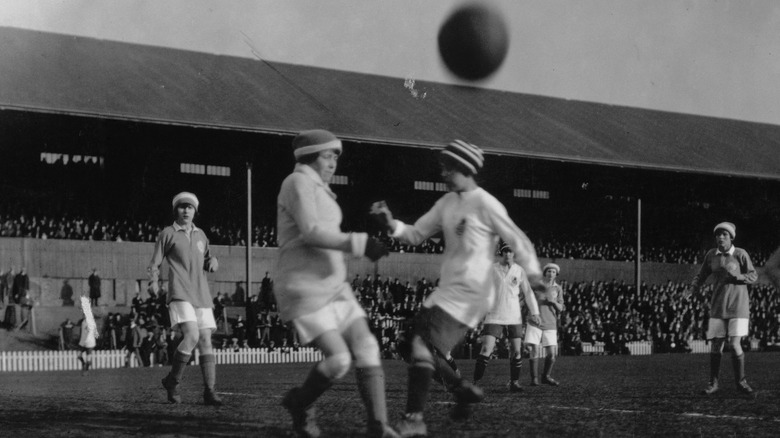Why Women Were Once Banned From Playing Soccer
There have been indelible images from the world of women's soccer. These past images include Brandi Chastain ripping off her shirt to show her sports bra as she celebrated the women's team's 1999 World Cup win, via The New York Times, Megan Rapinoe taking a bow in the corner of the field, per the Los Angeles Times, and Alex Morgan pretending to take a sip of tea after a goal against England, per CNN.
Women have been in the spotlight for many years, but it wasn't always the case. There was a time when they were not allowed on the field, thanks to outdated chauvinistic rules. Men felt that it was not safe for women to be playing sports, or even doing things like running marathons. What's worse, there was a time that women were allowed to come out of the shadows and play, only to be pushed back into those same shadows.
Women playing during WWI were just as good as men
It was in England during World War I. Men were being sent off to battle for the country and risk their lives, and women were more than willing to help with the war effort. They did this by working at the munitions factories to make the equipment that the soldiers needed. Then they began to entertain their fellow civilians on the soccer field, per the BBC.
A league even formed among the factory workers. The Dick, Kerr ladies from a munitions factory in Preston was the one that essentially started it all. These women were not dainty waifs, either. Apparently, Lilly Parr, who played on the team, had such a booming shot it broke a male goalkeeper's arm.
There was a lot of success, but then the men started returning home from the war in 1921. After which, the women were pretty much told that their place was in the home, not on the football pitch. They were refused entry on the field.
Yet, over the generations, women never stopped working to be able to do the same things that men do, and the efforts have succeeded in sports like soccer and basketball thanks to Title IX, which passed in 1972, per History, along with many Olympic events. Surely, the women from the Dick, Kerr soccer team would watch all of this with pride.

